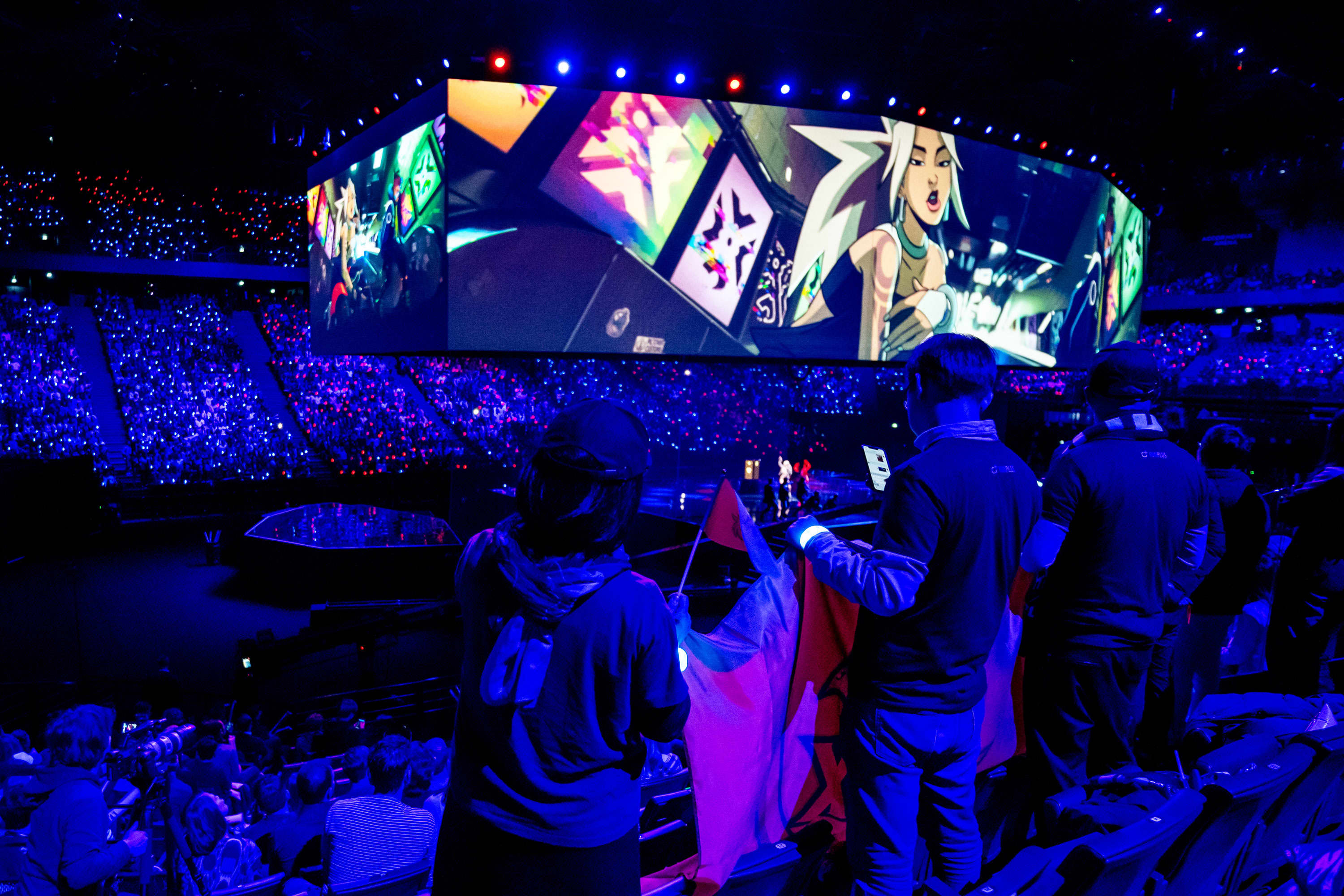How League of Legends' hip-hop group, True Damage, shows where Riot Games is heading

Fans watch the debut of Riot Games-created hip hop group True Damage during the opening ceremony of the 2019 League of Legends World Finals
Source: Riot Games
Keke Palmer took to the big stage in Paris' AccorHotels Arena over the weekend, performing for millions of League of Legends fans in a grand opening ceremony that rivaled any of the grandest events seen in traditional sports.
But this time, she did so as part of a music group created entirely by the league's operator, Riot Games, specifically for one of the most dedicated gaming fanbases, which was gathered to see FunPlus Phoenix and G2 Esports duke it out in this year's world finals.
True Damage, as the hip-hop group is known, featured Palmer alongside artists Becky G, Soyeon, Duckwrth and Thutmose, who impersonated some of League of Legend's most popular characters. It was put together not only to promote a set of new in-game skins and a partnership with Louis Vuitton, but to also represent the Tencent-owned game developer's ever-expanding foothold in the wider entertainment landscape.
And given the continued growth of the gaming industry – projected to hit over $150 billion in revenue this year, according to Newzoo – the 26-year-old singer-actress wasn't the least bit surprised that she was asked to be part of a music group dedicated to a fanbase of gamers.
"I know that the gaming world is major," said Palmer. "From when I was a kid to now, seeing how it's grown and evolved, I know what this world is. So when [Riot] came to me, I didn't know about League of Legends, but I knew this was the real deal."
"Just the level of production value and how they're transforming these characters and giving them this new face and vibe with this music, I fell in love with the universe," she added.
The winner of the 2019 League of Legends World Finals, FunPlus Phoenix, hoist the Summoner's Cup
Source: Riot Games
True Damage was actually a follow-up to last year's finals when Riot Games unveiled a Korean pop group they created called K/DA to a crowd of over 23,000 in Incheon's Munhak Stadium in South Korea. It's also just the latest in a long line of projects Riot Games has put out in an attempt to establish itself as more than just a game developer.
Riot has created its own original cinematics, music and other original content for years, but more recently the company has kicked up its efforts to expand beyond gaming. This year, Riot released the first set of comics based on its League of Legends characters, the result of a partnership with Marvel Comics signed last November.
In October, Riot also revealed that it was creating its first animated show series titled "Arcane," also based on some of its most popular in-game characters.
Founder Marc Merrill said it's all a result of meeting the demands of a fanbase of consumers that impresses not just on sheer scale (the game sees about 8 million peak concurrent players a day), but also one that has become extremely dedicated to the League of Legends intellectual property over time.
"We built an organization from the ground up, meant to hyper-serve a particular niche audience, all the elements are designed to laser focus on that," he said. "We do things in what we perceive to be player demand, so there's no corporate goal that's alluding to a specific revenue growth target and no public investor that's saying improve by [a certain percentage] next quarter."
"That's short-term, and we're about long-term value delivery to our players," Merrill continued. "That's how we get a lot of engagement."
That's not to say that other publishers haven't adapted their IPs from gaming into other popular media before. Japanese publishers Square Enix and Capcom, for example – who created the well-known Final Fantasy and Resident Evil franchises, respectively – have leveraged their games' popularity to create movies and animated shows as well. Western publishers, like Angry Birds' creator Rovio, have also done the same.
But Doug Clinton, managing partner and co-founder of venture capital firm Loup Ventures, said that the ability to tap into the devoted consumer base that Merrill outlined is exactly the reason why Riot has been able to successfully branch out to other mediums.
He said the game developer's commitment in building its esports scene is one big factor that has distinguished it from other publishers — many of whom don't have big esports aspirations. It also supports their goals to become a wider entertainment entity.
"Gaming and entertainment in general is a battle for attention," he said. "You're competing against Facebook and Netflix for eyeballs."
"That's what the gaming world has become, and I think bootstrapping content on worlds that have [hugely dedicated fanbases] is the best way to compete in this attention economy we're moving into," Clinton said.
Clinton predicts that other publishers – Fortnite creators Epic, for instance – will also continue to tap into their own fanbases and expand into other areas. Back in February, Epic hosted its own in-game virtual concert in Fortnite featuring a performance by popular DJ Marshmello, with the virtual show drawing in over 10 million players as attendees.
Palmer expects that in Riot's case, original music groups like K/DA and True Damage will ultimately elevate the music industry.
"I think it just creates a bigger opportunity and world especially for music and how people relate to music and how they're able to receive music," she said.
Riot Games confirmed on Sunday that next year's League of Legends World Finals will be held in Shanghai's 56,000-capacity Shanghai Stadium.
Read More
No comments